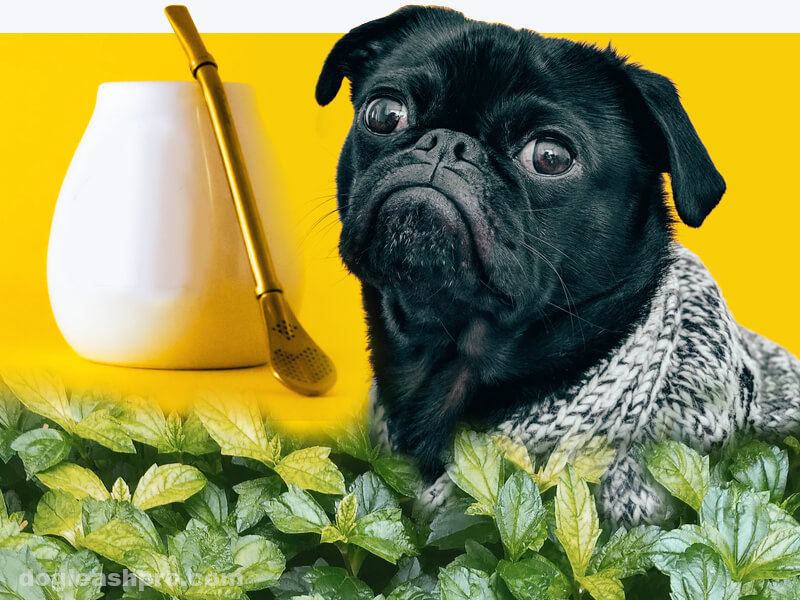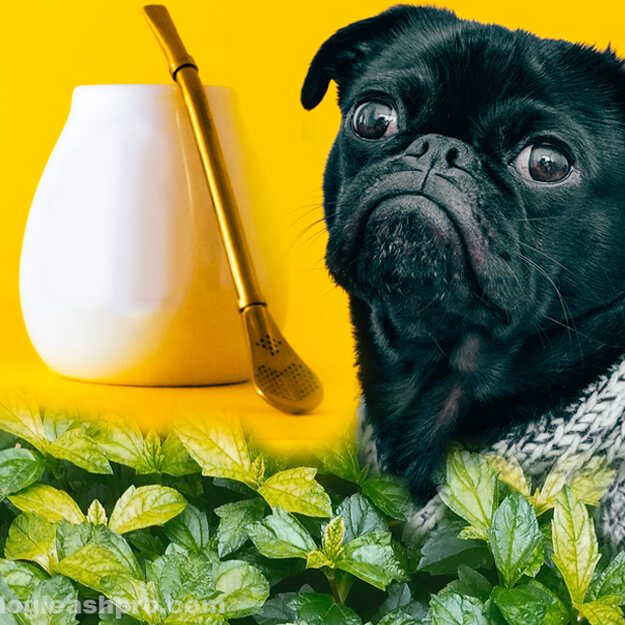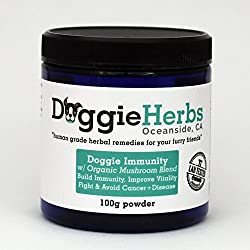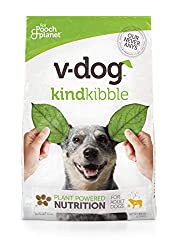
Can dogs have Peppermint Tea? Yes, dogs can have Peppermint Tea in moderation and if it is decaffeinated. Peppermint Tea, in general, should be relatively safe for your dog to drink and has been known to help with certain digestive issues in humans and may have the same health benefit for your dogs. There are some precautions that need to be taken, though, so make sure you read on before giving Peppermint Tea to your pup!
Ever wonder if your dog can have fresh cool Peppermint Tea? You may have heard that Peppermint Tea can provide your dogs with several health benefits. So what exactly are they? But first, can our dog actually have Peppermint Tea? Let’s dive deeper to find out.
Table of Contents
Can dogs have peppermint Tea?

Yes, dogs can drink Peppermint Tea in moderation and only if the Peppermint Tea is decaffeinated.
Unlike carbonated drinks, Peppermint tea is considered safe and canine-friendly because it does not contain caffeine.
However, you should still be mindful of any additional additives that may be present within your particular brand of Peppermint Tea.
Whenever you’re giving your furry friends any human foods or drinks that are not specifically designed for canines, always practice moderation and restraint.
This means giving your four-legged friends a little bit of Peppermint Tea to see if they have any adverse reactions to the drink.
If all is well, then you can consider giving them some more Peppermint Tea very sparingly and infrequently.
What is Peppermint Tea?

Peppermint Tea is a popular herbal infusion made from the leaves of the peppermint plant (Mentha x piperita), a hybrid species belonging to the mint family.
Known for its refreshing and invigorating taste, the tea boasts an incredible menthol aroma and flavor.
Many enjoy Peppermint Tea because it is caffeine-free, making it an ideal choice for those looking to reduce their caffeine intake or enjoy a calming beverage at any time of the day.
The plant is native to Europe and Asia but has since spread to other parts of the world due to its culinary and medicinal applications.
Apart from its delightful taste, Peppermint Tea offers a variety of health benefits thanks to its active ingredient, menthol.
It has been traditionally used to aid digestion, relieve gastrointestinal discomfort, and alleviate symptoms of irritable bowel syndrome.
The tea also possesses antispasmodic properties, which may help reduce muscle cramps and spasms.
Additionally, Peppermint Tea has been associated with providing relief from headaches, nasal congestion, and stress, as well as improving mental focus and concentration.
However, it is important to note that more scientific research is needed to substantiate these claims.
Is Peppermint Tea safe for dogs?
Yes, Peppermint Tea is safe for dogs in moderation if it is decaffeinated and if your furry friends aren’t allergic to it.
The antioxidant properties in Peppermint Tea may prove beneficial for your canine pals by reducing inflammation of the liver and intestines though no studies have backed this up.
With that said, the best drink to give your K9 friends is still simply the good old plain tap or bottled water. Water should be the main source of hydration for your pooch and nothing should come close to it.
However, there are times when your precious pup may feel sick or unwell and may lose his or her appetite. If your canine friend is feeling sick or unwell, there are certainly safe dog-friendly drinks you can look into.
So, does this mean all dogs can drink Peppermint Tea?
Not necessarily.
There are times when dogs should not drink Peppermint Tea. There are two possible reasons why your furry friends should not have Peppermint Tea.
First, your dog may be allergic to it, similar to how some dogs are allergic to peanut butter in Reese’s Pieces.
The second reason is that some components of Peppermint Tea could lead to an upset stomach or even poisoning in dogs.
Peppermint Tea for dogs can be bad for a dog’s stomach or intestines so it should only be given as an occasional treat.
The main thing to watch out for is how often and how much you give your dog.
In general, it’s best to avoid any tea that has additives and especially watch out for caffeine as this can be bad news for your furry friend.
Always practice moderation and seek professional veterinary help if you notice any negative reactions from your dog.
Can Peppermint Tea help dogs?
Peppermint Tea can help and benefit dogs, but it should be used cautiously and in moderation.
The menthol in Peppermint Tea has natural cooling and anti-inflammatory properties, which can help alleviate a dog’s bad breath, soothe minor digestive issues, and reduce flatulence.
It may also help relieve skin irritations caused by insect bites or allergies when applied topically.
However, it is essential to consult with a veterinarian before introducing Peppermint Tea to your dog’s diet, as excessive consumption of peppermint can lead to adverse effects, such as gastrointestinal distress or even toxicity.
Additionally, the tea should be prepared without any additives, like sugar or honey, to ensure it remains safe for canine consumption.
So, can I give my dog Peppermint Tea for upset stomach?
While Peppermint Tea has been known to help alleviate minor digestive issues in humans, its effects on dogs may need to be more well-defined.
If your dog is experiencing an upset stomach, it is essential to consult with a veterinarian for proper diagnosis and guidance.
Although small amounts of cooled, unsweetened Peppermint Tea may help soothe your dog’s stomach in some cases, it is not a universally recommended treatment, as individual dogs may react differently to the tea.
Moreover, excessive consumption of Peppermint could lead to gastrointestinal distress or toxicity in dogs.
Therefore, it is always better to rely on professional advice to ensure the safety and well-being of your pet.
Are dogs allergic to Peppermint Tea?
Dogs are not typically allergic to Peppermint Tea. However, individual dogs may have unique sensitivities or reactions to it.
While small amounts of unsweetened, cooled Peppermint Tea could benefit some dogs, excessive consumption may cause gastrointestinal distress or even toxicity in others.
As with any new food or drink, monitoring your K9 family members for signs of an adverse reaction when introducing Peppermint Tea into their diet is crucial.
Always consult a veterinarian before giving your pup any herbal tea, including Peppermint Tea, to ensure their safety and well-being.
Is Peppermint Tea safe for dogs to smell?
Peppermint Tea is generally safe for dogs to smell, as the aroma of Peppermint is not known to be toxic or harmful to dogs.
In fact, the scent of Peppermint can have a calming effect on some dogs, similar to how it affects humans.
However, it is essential to be cautious when using strong scents, including Peppermint, around dogs, as their olfactory senses are significantly more sensitive than ours.
Excessive exposure to strong odors may cause irritation or discomfort in some dogs.
It is always a good idea to monitor your dog’s reaction to new scents and consult with a veterinarian if you have any concerns.
Peppermint Tea benefits for dogs
While Peppermint Tea may benefit dogs, it is important to remember that individual dogs may react differently.
It is crucial to consult a veterinarian before introducing Peppermint Tea into your furry friend’s diet.
Some potential benefits of Peppermint Tea for dogs include the following:
- Freshens breath: Peppermint tea’s menthol content can help combat bad breath in dogs by neutralizing odor-causing bacteria.
- Soothes upset stomach: The antispasmodic properties of Peppermint Tea may help alleviate mild gastrointestinal discomfort in dogs.
- Reduces flatulence: Peppermint Tea can help minimize excessive gas production in a dog’s digestive system.
- Calming effect: The aroma of Peppermint Tea may have a soothing effect on anxious or stressed dogs, promoting relaxation.
- Antimicrobial properties: Peppermint Tea contains compounds with antimicrobial properties, which could help fight bacterial infections in dogs.
- Anti-inflammatory properties: The menthol in peppermint tea can help reduce inflammation, potentially relieving conditions like arthritis or joint pain.
- Topical relief: When applied topically, Peppermint Tea may help soothe skin irritations caused by insect bites or allergies.
- Respiratory relief: The aroma of Peppermint Tea could help clear a dog’s nasal passages and relieve mild congestion.
- Boosts immune system: The antioxidants present in Peppermint Tea may help strengthen a dog’s immune system.
- Aids in digestion: Peppermint Tea may help stimulate the digestive system, improving the overall digestion process in dogs.
It is essential to emphasize that these benefits are not universally applicable to all dogs, and excessive consumption of Peppermint Tea may lead to adverse effects.
We highly recommend that you consult with your veterinarian before giving your pooch Peppermint Tea to ensure the safety and well-being of your four-legged friend.
Can dogs drink warm tea?
If you do decide to give your dog Peppermint Tea be sure that you give it to them at room temperature as most dogs prefer it. A slightly warm tea should be fine if your dog decides to drink it as this could help them keep warm on cold winter days or especially cool nights.
Never give your dog scolding hot or boiling tea, slightly warm to the touch is as hot as any drink given to your dog should be. Most dogs will reject boiling hot drinks or drinks they deem too hot, never try to force your dog to drink as this could lead to painful burns in their mouths.
Is it OK to give my dog tea?

It’s a good idea to avoid giving your dog anything other than normal room temperature water. The possible health risks of beverages meant for humans are too great.
Additives found in many drinks intended for human consumption can be very harmful and even dangerous to dogs. Remember that our drinks are designed for us, we are much larger and have a different makeup than dogs.
If the tea is decaffeinated and contains no additives it may be safe to give it to your dog. Caffeine is a stimulant and can increase your dog’s heart rate and affect their nervous system.
Every dog will react differently to different substances just like humans, it’s best to give them just a little bit of Peppermint Tea to see if they are able to handle it. Some dogs may have allergies to ingredients found in Peppermint Tea so be on the lookout for any adverse effects.
Can tea be harmful to dogs?
Peppermint Tea can be a nice relatively safe occasional treat for your dogs, but you should make sure it’s the decaffeinated type as caffeinated tea has the potential to cause heart palpitations, tremors, lung failure, seizures, and vomiting in dogs if too much is given at once or over time.
This is why you need to be super careful as even a seemingly small amount of caffeine found in certain teas can cause serious complications. Since Peppermint is typically decaffeinated you should be ok but it doesn’t hurt to double-check the packaging.
You should avoid all sources of caffeine when feeding your dog and stick to normal everyday water as their main source of liquid.
Effects of caffeine on dogs

Caffeine is one of the most widely consumed substances in the world. Whether it’s from coffee, tea, soda, or energy drinks, caffeine can be found everywhere. Caffeine toxicity in dogs may occur when they ingest products containing caffeine or products that contain ingredients with added caffeine such as guarana extract.
Clinical signs of caffeine toxicity typically start within 20 to 60 minutes after ingestion and can make your dog feel restlessness, hyperactivity, agitation, or even begin vomiting and panting.
If you notice your dog’s heart rate starts racing and beating irregularly you should contact your veterinarian immediately. With caffeine poisoning prompt care is critical, a veterinarian can often treat the overdose if caught early.
Caffeine takes about a day or so to be fully purged from your dog’s system, and most dogs will recover if they are treated in a timely manner.
Dog-friendly tea
While certain human teas may be ok for your dog to drink there are companies out there who offer specially formulated doggie brand teas your dog will absolutely love. These safe alternatives could be exactly what you are looking for if you want to treat your dog to something exotic in a safe manner.
To add a bit of herb into our pup’s diet, we treat her with the following:
So, Can Dogs have Peppermint Tea?
During winter time many people reach for Peppermint Tea to help with the holiday blues. Whether you’re a dog owner or not, it’s important to know if your pup can have some of that soothing beverage too!
Peppermint Tea in general should be relatively safe for your dog to drink. Peppermint Tea has been known to help with certain digestive issues in humans and may have the same benefit for your dog.
Practice moderation and remember that your dog isn’t human and shouldn’t have human foods or drinks regularly. If you notice any adverse effects after giving your dog any type of food, be sure to contact your veterinarian immediately.
Related Questions
Chamomile tea and ginger tea are generally considered safe for dogs when given in moderation and under the guidance of a veterinarian. These herbal teas may help soothe a dog’s upset stomach, reduce inflammation, and alleviate stress. Still, it is crucial to consult with a professional before introducing them into your dog’s diet.
DISCLAIMER: THIS WEBSITE DOES NOT PROVIDE MEDICAL ADVICE
The information, including but not limited to, text, graphics, images and other material contained on this website are for informational purposes only. No material on this site is intended to be a substitute for professional veterinary advice, diagnosis, or treatment. Always seek the advice of your veterinarian or other qualified health care provider with any questions you may have regarding dietary needs.
Resources:
https://en.wikipedia.org/wiki/Peppermint
https://www.medicalnewstoday.com/articles/265214

With over five years of specialized experience as an animal writer, my expertise lies in dog nutrition, health, behavior, grooming, and training. I am dedicated to delivering helpful and informative content that caters to the well-being of our furry friends. My primary goal is to empower pet owners with knowledge and ensure our canine companions thrive in health and happiness. In my free time, I love volunteering at local dog rescue centers.










